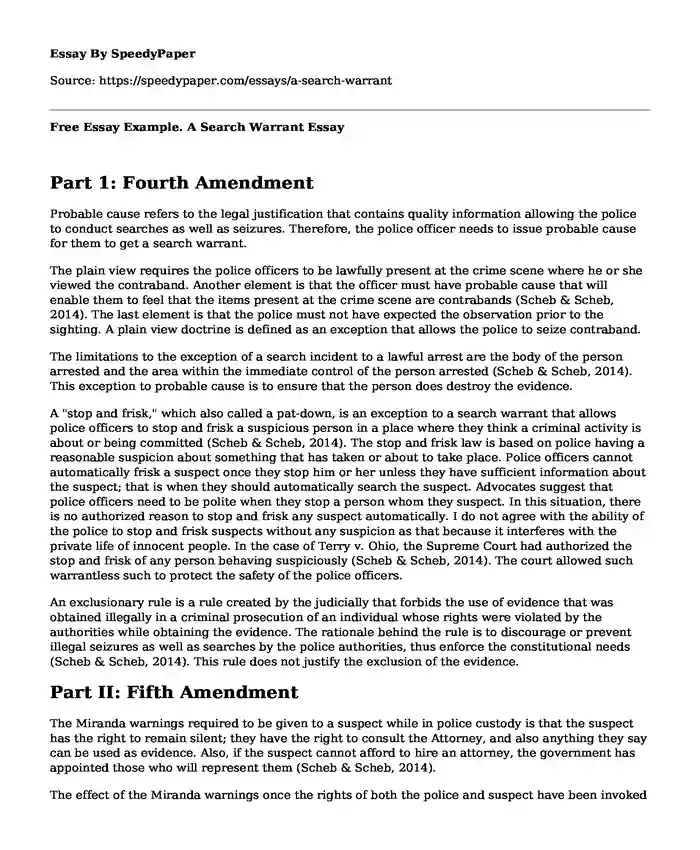
| Type of paper: | Course work |
| Categories: | Criminal law Police Criminal justice |
| Pages: | 4 |
| Wordcount: | 826 words |
Part 1: Fourth Amendment
Probable cause refers to the legal justification that contains quality information allowing the police to conduct searches as well as seizures. Therefore, the police officer needs to issue probable cause for them to get a search warrant.
The plain view requires the police officers to be lawfully present at the crime scene where he or she viewed the contraband. Another element is that the officer must have probable cause that will enable them to feel that the items present at the crime scene are contrabands (Scheb & Scheb, 2014). The last element is that the police must not have expected the observation prior to the sighting. A plain view doctrine is defined as an exception that allows the police to seize contraband.
The limitations to the exception of a search incident to a lawful arrest are the body of the person arrested and the area within the immediate control of the person arrested (Scheb & Scheb, 2014). This exception to probable cause is to ensure that the person does destroy the evidence.
A "stop and frisk," which also called a pat-down, is an exception to a search warrant that allows police officers to stop and frisk a suspicious person in a place where they think a criminal activity is about or being committed (Scheb & Scheb, 2014). The stop and frisk law is based on police having a reasonable suspicion about something that has taken or about to take place. Police officers cannot automatically frisk a suspect once they stop him or her unless they have sufficient information about the suspect; that is when they should automatically search the suspect. Advocates suggest that police officers need to be polite when they stop a person whom they suspect. In this situation, there is no authorized reason to stop and frisk any suspect automatically. I do not agree with the ability of the police to stop and frisk suspects without any suspicion as that because it interferes with the private life of innocent people. In the case of Terry v. Ohio, the Supreme Court had authorized the stop and frisk of any person behaving suspiciously (Scheb & Scheb, 2014). The court allowed such warrantless such to protect the safety of the police officers.
An exclusionary rule is a rule created by the judicially that forbids the use of evidence that was obtained illegally in a criminal prosecution of an individual whose rights were violated by the authorities while obtaining the evidence. The rationale behind the rule is to discourage or prevent illegal seizures as well as searches by the police authorities, thus enforce the constitutional needs (Scheb & Scheb, 2014). This rule does not justify the exclusion of the evidence.
Part II: Fifth Amendment
The Miranda warnings required to be given to a suspect while in police custody is that the suspect has the right to remain silent; they have the right to consult the Attorney, and also anything they say can be used as evidence. Also, if the suspect cannot afford to hire an attorney, the government has appointed those who will represent them (Scheb & Scheb, 2014).
The effect of the Miranda warnings once the rights of both the police and suspect have been invoked is that the interrogation stops, which delays the process of solving the case (Scheb & Scheb, 2014).
Under Miranda's line of cases, the police must provide the Miranda of warnings as a constituent of interrogation. The rationale behind this is to prevent the declaration of the evidence as illegally obtained (Scheb & Scheb, 2014).
The general requirements that may contribute to the validity of the waiver under Miranda are that if the suspects are doing it knowingly or voluntarily. Unless the suspect is doing it knowingly or voluntarily, then the waiver will be considered invalid (Scheb & Scheb, 2014).
The police officer immediately presents Miranda warnings to the suspect to protect the evidence provided by the suspect or any evidence that they may derive from the statements made by the suspect. However, the US Supreme Court recognized that the public or the police need safety, and therefore, they issued an exception (Scheb & Scheb, 2014). The exception allowed the police officers to ask the suspect some questions before providing the Miranda to enable them to locate weapons that may be used to harm the people or the police.
I do agree with the requirements of Miranda because the police might take advantage of their powers and act brutally to the suspects incriminating them to speak. Without Miranda's requirements, justice will not prevail. The most vulnerable people who have less influence over the authority will suffer as they will be incriminated to talk. There will be a lack of justice for those who will not manage to hire an attorney to represent them. Therefore, I agree that the requirements of Miranda are essential as they try to ensure that there is justice.
References
Scheb, M., J & Scheb M., J. II. (2014). Criminal Law & Procedure 8th Edition. Wadsworth Publishing
Cite this page
Free Essay Example. A Search Warrant. (2023, May 23). Retrieved from https://speedypaper.net/essays/a-search-warrant
Request Removal
If you are the original author of this essay and no longer wish to have it published on the SpeedyPaper website, please click below to request its removal:
- Gun Laws in School - Essay Sample for You
- Essay Sample for Everyone: Noble Cause Corruption in Criminal Justice
- Law Essay Example: Ledbetter vs. Goodyear Tire and Rubber Company
- Free Essay Example on Water Stations
- Paper Example. Texas Trial Lawyers Association
- Essay Sample on Definitions and Conceptualizations of Crime
- Essay Example. Hypothetical Methodology
Popular categories




